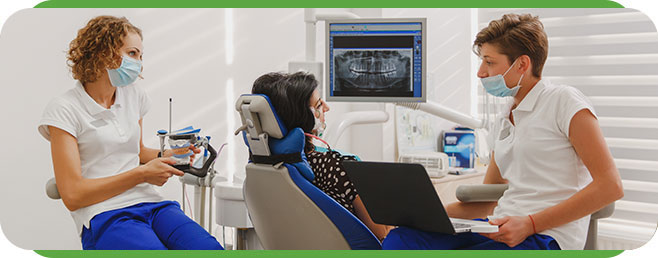Dislocated Jaw Treatment Professional Q&A
If you are feeling persistent jaw pain or tenderness, swelling or bruising around the jaw joint, clicking or popping noise from the jaw, stiffness or limited range of motion, or difficulty speaking, chewing, or swallowing, you might have a dislocated jaw. Come to Koala® Center For Sleep & TMJ Disorders and see our professionals for comprehensive treatment. For more information, contact us or book an appointment online. We have convenient locations across the U.S. in Bloomington IL, Peoria/Dunlap IL, El Paso TX, and Wausau WI.


Table of Contents:
What is a dislocated jaw?
What are the symptoms of a dislocated jaw?
What causes a dislocated jaw?
How do you tell if my jaw is dislocated?
A dislocated jaw is a condition that occurs when the lower part of the jaw, known as the mandible, is pulled away from its proper alignment on one or both sides. You can dislocate your jaw if you experience trauma to the face or neck. In addition, people who have problems with their temporomandibular joint (TMJ) are more susceptible to jaw dislocations.
Depending on the severity of your dislocation, you may experience significant pain or be unable to eat or speak properly. If your jaw looks visibly out of place, it is a strong indication that it could be dislocated. If you suspect you may have dislocated your jaw, it’s important to see a healthcare professional promptly, as leaving it untreated or trying to manipulate it back into place yourself is dangerous and can cause further damage and complications in the future.
When you have a dislocated jaw, you may experience a variety of symptoms, which will vary depending on the severity of the dislocation. Some of the most commonly reported symptoms associated with jaw dislocations include:
– Persistent jaw pain or tenderness – A hallmark symptom of jaw dislocation is chronic discomfort or soreness around the area, which tends to worsen when the joint is moved.
– Swelling or bruising around the joint – If you’ve dislocated your jaw, you’ll likely notice visible bruising and swelling on your lower face.
– Clicking or popping noise from the jaw – You may hear sounds from the jaw joint when you try to open or close your mouth. This is indicative of jaw joint instability.
– Stiffness or limited range of motion – It’s common to experience difficulty fully opening or closing the mouth, accompanied by a sensation of stiffness or resistance in the jaw joint when it is dislocated.
– Difficulty speaking, chewing, or swallowing – When the jaw is dislocated, routine movements required to eat and speak often become painful or impossible.
There are various common causes of a dislocated jaw, such as:
– Trauma – Experiencing trauma to your face, head, or neck is the primary cause of jaw dislocation. If the force is great or sudden enough, it can result in the mandible popping out of place on one or both sides.
– Overuse – Excessive or repetitive movements of the jaw, such as yawning widely, chewing gum excessively, or engaging in long speaking or singing sessions, can strain the jaw joint and increase the likelihood of dislocation.
– TMJ dysfunction – If you have problems with your TMJ or have a family history of TMJ concerns, you may have a weaker jaw and be more susceptible to jaw dislocation.
– Bruxism – If you have a condition known as bruxism, which means you clench or grind your teeth while you sleep, you can dislocate your jaw due to the repetitive motion and strain exerted on the joint over time.
– Dental procedures – In some cases, jaw dislocation can occur after a dental procedure, such as wisdom teeth extraction, implant surgery, or a root canal treatment.
– Certain medical conditions – Underlying medical conditions, such as Ehlers-Danlos syndrome, can affect the strength and stability of the jaw joint.
It’s important to be aware of the symptoms of jaw dislocation so you can notice the signs quickly if they happen to you. If you notice concerns such as chronic jaw pain, difficulty eating or speaking, or inflammation around one or both jaw joints, it is strongly urged that you book an appointment with a professional.
To diagnose the issue, the provider will use physical examinations as well as X-ray technology. Once a diagnosis is made, the healthcare professional will let you know the severity of the dislocation and the recommended treatment options. Overall, if you suspect you may have dislocated your jaw, reach out to a healthcare professional today.

Additional Services You May Need
▸ KoalaKIDZzz®
▸ Sleep Apnea
▸ Snoring
▸ TMJ Disorder
▸ Fatigue
▸ Sleep Disorders
▸ Weight Loss
▸ CPAP Alternative
▸ Oral Appliances




